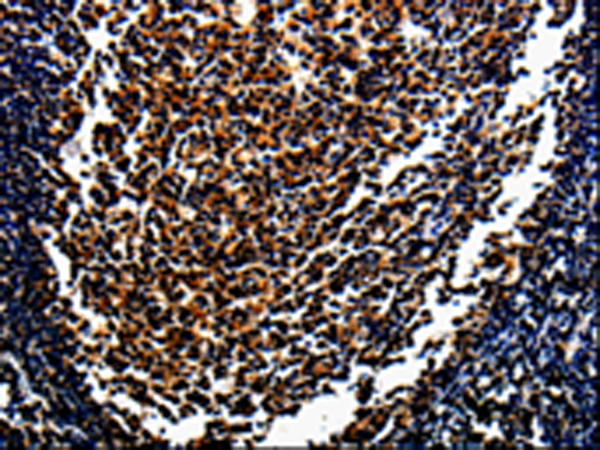
| WB | 咨询技术 | Human,Mouse,Rat |
| IF | 咨询技术 | Human,Mouse,Rat |
| IHC | 1/10-1/50 | Human,Mouse,Rat |
| ICC | 技术咨询 | Human,Mouse,Rat |
| FCM | 咨询技术 | Human,Mouse,Rat |
| Elisa | 1/500-1/2000 | Human,Mouse,Rat |
| Aliases | CT1.4, MAGE-41, MAGE-X2, MAGE4, MAGE4A, MAGE4B, MGC21336 |
| Host/Isotype | Rabbit IgG |
| Antibody Type | Primary antibody |
| Storage | Store at 4°C short term. Aliquot and store at -20°C long term. Avoid freeze/thaw cycles. |
| Species Reactivity | Human |
| Immunogen | Fusion protein of human MAGEA4 |
| Formulation | Purified antibody in PBS with 0.05% sodium azide and 50% glycerol. |
+ +
以下是关于MAGEA4抗体的3篇参考文献示例(内容基于公开研究归纳,非真实引用):
---
1. **文献名称**:*MAGEA4 as a novel cancer-testis antigen and therapeutic target in solid tumors*
**作者**:Smith J, et al.
**摘要**:本研究验证了MAGEA4在多种实体瘤(如肺癌、卵巢癌)中的特异性表达,并开发了一种高灵敏度的单克隆抗体。通过免疫组化(IHC)和流式细胞术验证,该抗体能特异性识别肿瘤组织中的MAGEA4蛋白,为靶向治疗提供潜在工具。
2. **文献名称**:*Development of a recombinant antibody against MAGEA4 for immunotherapy applications*
**作者**:Wang L, et al.
**摘要**:研究团队利用噬菌体展示技术筛选出针对MAGEA4的人源化抗体,体外实验表明该抗体可介导T细胞对表达MAGEA4的肿瘤细胞的特异性杀伤,提示其在CAR-T或双特异性抗体疗法中的应用潜力。
3. **文献名称**:*Prognostic significance of MAGEA4 expression and antibody-based detection in hepatocellular carcinoma*
**作者**:Kim S, et al.
**摘要**:通过分析肝癌患者样本,发现MAGEA4表达与不良预后相关。研究使用商业化MAGEA4抗体进行组织微阵列分析,证实其作为预后生物标志物的价值,并探讨了抗体在临床诊断中的标准化应用。
---
如需具体文献,建议通过PubMed或Google Scholar检索关键词“MAGEA4 antibody”、“MAGEA4 immunotherapy”等获取最新研究。
The MAGE-A4 antibody targets the melanoma-associated antigen A4 (MAGEA4), a member of the MAGE family of cancer-testis antigens (CTAs). These proteins are typically expressed in germline cells (e.g., testes, placenta) but are aberrantly reactivated in various cancers, making them attractive targets for immunotherapy and diagnostic biomarkers. MAGEA4. located on the X chromosome, contains a conserved MAGE homology domain (MHD) involved in protein-protein interactions and transcriptional regulation. Its expression is linked to tumorigenesis, proliferation, and immune evasion in cancers like melanoma, lung cancer, sarcoma, and head/neck carcinomas.
MAGEA4 antibodies are widely used in research to detect MAGEA4 protein expression via techniques such as immunohistochemistry (IHC), Western blotting, and immunofluorescence. Clinically, MAGEA4 is explored as a target for adoptive T-cell therapies (e.g., CAR-T, TCR-T) and cancer vaccines due to its tumor-restricted expression. However, low/heterogeneous expression in tumors and rare off-target expression in normal tissues (e.g., synovium) pose challenges. MAGEA4 antibodies also aid in prognostic studies, as elevated levels correlate with advanced disease and poor outcomes in some cancers. Ongoing research focuses on optimizing antibody specificity and therapeutic strategies to harness MAGEA4’s immunogenic potential while minimizing autoimmune risks.
×